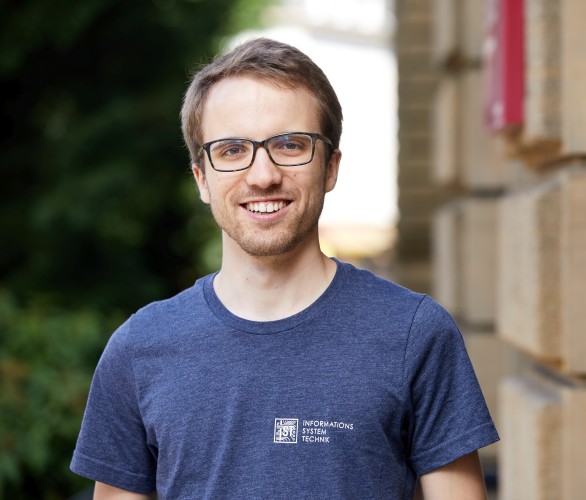Published: 10th August 2020
Recommended external content
We have selected external content from YouTube for you and would like to show it to you right here. To do this, you must reveal it with one click. You can hide the external content at any time with another click.
I agree to external content from YouTube being shown to me. This may result in personal data being transmitted to third-party platforms. You can find more information in our Privacy Policy.
David,
Information Systems Technology M.Sc.
The best and most important part of an etit degree programme for me is that you have opportunity to try out lots of different focus areas and check out some other options to gain greater insight into certain fields. This helps you find out what you’re good at and passionate about.

So much more than just cables and circuit boards
We continue to experience the same thing over and over again: a lot of people cannot imagine what electrical engineering and information technology entails. And this is despite the fact that electrical engineering is everywhere today! Equipped with the requisite theoretical and practical fundamental knowledge which you learned in each of the extensive study courses, you will be real all-rounders with the ability to specialise in numerous areas.
Traditional electrical engineering is therefore the foundation which will accompany you throughout every degree at the etit department. One huge benefit in our opinion is that every interdisciplinary and in-depth degree contains the etit basic degree which enables you to continue studying electrical engineering. This means that even if you discover you want to do something different after your bachelor’s degree, you can study any area of etit. It’s fantastic that the department gives us so much freedom to develop in our occupations later on!
Diversity and a wide range of disciplines – the choice is yours
By now, you’re probably curious to find out more about the diversity of study options, aren’t you? Let’s get started! First of all, there is the classic degree in electrical engineering and information technology. This degree is so attractive thanks to the numerous options of consolidating knowledge, with a whole six areas you can specialise in! In addition to these, there is a wide range of interdisciplinary degree courses which offer exchange models. Pretty impressive options, aren’t they? A little insight for you: this freedom to select your area of focus is not available everywhere – here at TU Darmstadt, this option is at least 50 percent higher than in comparison to other technical universities!
So, we’ve drawn this out long enough and it’s now time to tell you about our own experiences in the two interdisciplinary degree courses of Information System Technology and Biomedical Engineering.
More than “just” electrical engineering – the degree programmes at the etit department
The Department of Electrical Engineering and Information Technology promises courses of an interdisciplinary nature, flexibility and diversity. Let us take a closer look at the numerous offers of interdisciplinary courses:
• Electrical Engineering and Information Technology
(B.Sc. / M.Sc. / B.Ed.)
With the option of a total of six specialisations:
Automation Systems, Computer-Aided Electrodynamics, Computer Engineering, Electrical Power Engineering, Communication and Sensor Networks; Sensors, Actuators and Electronics
• Mechatronics (B.Sc. / M.Sc.)
• Information Systems Technology (B.Sc. / M.Sc.)
• Biomedical Engineering (B.Sc. / M.Sc.)
• Information and Communication Engineering (M.Sc.)
• Business Administration/Industrial Engineering – specialising in Electrical Engineering and Information Technology (B.Sc. / M.Sc.)
• Computational Engineering (B.Sc. / M.Sc.)
• Energy Science and Engineering (M.Sc.)
Electrical Engineering and Information Technology form the theoretical foundation of all bachelor degrees at the etit department. The various focus areas and additional interdisciplinary approaches mean that there are many exciting options for personal growth. The best thing, though, is that you are flexible throughout the entirety of the programme and can easily switch between the degree courses!
From robotics to programming games – try everything!
Rule one of searching for a degree: don’t be led astray by what initially appear to be boring course descriptions. Information Systems Technology is really exciting and fascinating! I am currently in the second semester of my master’s degree and can vouch that my degree course acts as an interface between electrical engineering and information technology and provides exciting insight into all possible technical areas.
After completing the basic course, you can already begin selecting your focus areas from the 4th semester of your bachelor’s degree. This high level of flexibility created by the interdisciplinary approach deployed by the etit degree courses allowed me to try out many different areas. In my opinion, this is the most important part of a degree: trying things out to discover what you’re good at and what you’re passionate about. I stuck with robotics, a topic which is very closely related to Information Systems Technology, and eventually ended up writing my bachelor thesis on this subject. Recently, I have been trying my hand at a different, but equally fascinating area: games programming.
As you might have realised, both of these topics have close practical applications which I am currently dealing with. And this is exactly what makes the entire etit department so exciting. Alongside the many lectures on theory, learning practical applications is also a significant part. This makes sense to me, after all, just think: TU Darmstadt wants us to be good engineers. The numerous projects, placements and labs that take place alongside the degree aim to help smooth this path.
And when it comes to the significance of learning about practical applications, I am not alone in my opinion: my fellow student, Jennifer, is also hugely impressed by the great amount of project work in her Biomedical Engineering degree. See for yourself what she has to say.
David
Fighting robots, autonomous driving and much more – the practical offers at etit
The etit department always ensures exciting and diverse practical offers are available – all with the aim of providing the students with essential practical insight. One of many interesting examples relevant for the future is the Autonomous Driving project seminar. Here, groups of five students find practical solutions for challenges in autonomous driving on the basis of specific environments and problems which are close to reality, using a model car, different testing courses and more options to work on the fascinating project.
The Product Development Methodology project seminar is a dream come true for all technology fans. The approach to independently solve a technical problem is taught based on a motivational project with goals that change on an annual basis – a skill which is very useful when entering the workforce later on. Sometimes, your robots will have to grab things, or dive underwater, or even complete a ski jump; it all depends on the project! At the end of the seminar, the department traditionally lets all groups and their robots face off against each other. Whoever still has any doubts about how fantastic this seminar is: in 2013, it was rewarded with the Hessische Hochschulpreis für Exzellenz in der Lehre [Hesse University Prize for Excellence in Teaching].
Jennifer,
Biomedical Engineering B.Sc.
Electrical engineering is not just theoretical exercises and solving maths problems. One placement, lab or project seminar follows the next, meaning we can always experience what we learned in lectures in direct applications.

Practical experience is important
Are you not only interested in traditional electrical engineering, but are also fascinated by the human anatomy, biomechanics and more? Then my degree course in Biomedical Engineering will be just what you’re looking for! 80 % etit, 20 % medicine, is how this degree course is described – and I can confirm this! As a cooperative degree with the Goethe University Frankfurt, we biomedical engineers spend four days a week at TU Darmstadt and one day in the University Clinic in Frankfurt. This means that both fundamental technical and medical knowledge is taught during the bachelor’s degree. It’s the best of both worlds in my opinion. From the fifth semester on, you concentrate on a specific area and test your strengths in a selection of fields from a vast spectrum of choices.
I have to agree with David in that the real fascination of the etit degree courses is certainly in the many practical experiences we gather throughout our degree. It becomes very clear that electrical engineering is not just theory or working out maths problems. Of course, there is fundamental theoretical knowledge we need to know, but we are given the opportunity early on to apply this knowledge in a practical manner.
For Biomedical Engineering and pretty much all etit degree courses, the following applies: Placements and labs are a part of the degree. Early on in the degree, theoretical knowledge is tested through experiments and impressive results are recorded and evaluated in a scientific manner. I am particularly looking forward to the clinical internship at the University Clinic in Frankfurt in my fifth and sixth semesters. For me, the best part of my entire degree is working on finding solutions for problems in small groups.
And the coronavirus pandemic is by no means a hindrance to successfully completing a lab. I am currently completing my measuring technology lab from home. With a script for the experiments, a video recording on the process and the measuring data, we can create diagrams and answer questions on the experiment. It’s not quite the same as it would have been, but it still has a close practical orientation. Our department clearly really thinks about offering us the best possible experiences despite this situation and puts in the effort to ensure this.

Jennifer
Hi, I’m Jennifer and I am studying Biomedical Engineering at TU Darmstadt. Before I ended up here, I had already started a law degree and had spent a semester abroad. However, I decided to change courses and this is a decision I have never regretted. I hope to be able to use my personal experiences to help you in choosing your degree programme and support you when you start out.

David
Hi, I’m David and I’m doing my master’s in Information Systems Technology. As you’ve probably never heard of it: this degree is a combination of electrical engineering and information technology, as well as computer sciences, meaning it’s the best of both worlds! I love the great diversity of my course and that you can choose your own focus areas from many different modules from the two “main” subjects.I’ll tell you more about what makes my degree at TU Darmstadt so special here.





